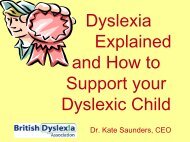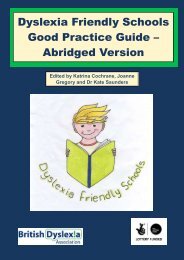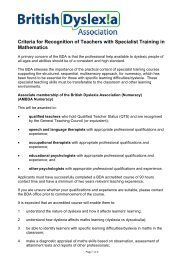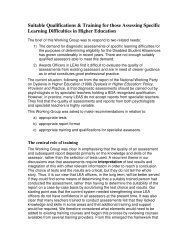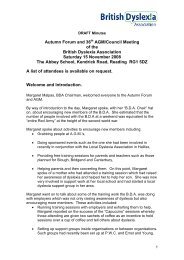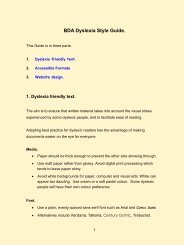Intervention for Dyslexia - The British Dyslexia Association
Intervention for Dyslexia - The British Dyslexia Association
Intervention for Dyslexia - The British Dyslexia Association
You also want an ePaper? Increase the reach of your titles
YUMPU automatically turns print PDFs into web optimized ePapers that Google loves.
Reader guidance (DCSF, 2008). Evaluations of some of these other interventions are<br />
included in Chapter 3 of this report.<br />
5.2 Evaluations of Reading Recovery in the rest of the<br />
world<br />
5.2.1 Large-scale international evaluations and reviews<br />
Reading Recovery programmes have been evaluated according to various metrics, the<br />
most commonly adopted being the number of pupils who are ‘successfully discontinued’<br />
from the programme – i.e. those who reached the criterion level of improvement.<br />
Another metric less commonly employed is the extent to which Reading Recovery pupils<br />
are able to keep pace in literacy development with other pupils after the programme has<br />
finished. A considerable number of evaluations of Reading Recovery have been carried<br />
out in the last 25 years, but these have often been small-scale, not independent, and<br />
rarely reported first-hand in peer-reviewed journals. However, literature searches<br />
uncovered several larger-scale evaluations carried out in New Zealand, the US and<br />
Australia, which show that the percentage of Reading Recovery pupils who have<br />
completed a full programme who are successfully discontinued is about 70%–80%,<br />
except <strong>for</strong> New Zealand and the State of Victoria in Australia, where the percentage is<br />
somewhat higher: 84%–90% (Anand & Bennie, 2004, 2005; Cosgrave, Bennie &<br />
Kerslake, 2002; Gomez-Bellenge, Rodgers and Schulzt, 2005; Kerslake, 1999, 2000,<br />
2001; Lyons, 2003; Lyons & Beaver, 1995; McDowall, Boyd and Hodgen, 2005;<br />
Shanahan & Barr; 1995). Between 8% and 20% are referred <strong>for</strong> additional services.<br />
Note that ‘success’ in this context does not necessarily mean that the child will be<br />
reading within the normal range nationally, only that the Reading Recovery teacher has<br />
judged the child’s book reading ability to be within the average range of the class the<br />
child belongs to.<br />
Reviews of Reading Recovery evaluations in the early and mid-1990s were mostly<br />
positive, concluding that, although costly, Reading Recovery generally resulted in<br />
significant gains in reading (e.g. D’Agostino & Murphy, 2004), although it was noted that<br />
it was less effective in maintaining those gains and it would be an unwise strategy to<br />
shift all resources <strong>for</strong> remediation into Reading Recovery because some students would<br />
be likely to require additional or continuing support (Wasik & Slavin, 1993; Shanahan &<br />
Barr, 1995). Reviews also commented that the effectiveness of Reading Recovery would<br />
be likely to be increased if it incorporated techniques that had been shown in research<br />
to promote early reading skills, such as explicit instruction in phonics (see also Section<br />
5.1.5). During the 1990s, however, increasing concerns began to emerge in the US and<br />
elsewhere in the world regarding Reading Recovery (see Hiebert, 1994; Shanahan &<br />
Barr, 1995; Grossen, Coulter & Ruggles, 1997; Elbaum, Vaughn, Hughes & Moody,<br />
2000). Many of the issues concerning evaluation of the effectiveness of Reading<br />
Recovery have been summarised and discussed by Reynolds and Wheldall (2007), who<br />
concluded:<br />
“RR has established a reputation as being a remarkably successful intervention …<br />
research, however, indicates that it has not delivered all that it promised to deliver:<br />
long-term change <strong>for</strong> students and a significant reduction in demand <strong>for</strong> special<br />
education services in later years. Evidence indicates that RR is beneficial <strong>for</strong> those<br />
students who are discontinued but that it is less beneficial <strong>for</strong> students who have<br />
incomplete programmes, are withdrawn, or are referred to special education. In fact, the<br />
100 <strong>Intervention</strong> <strong>for</strong> <strong>Dyslexia</strong>



